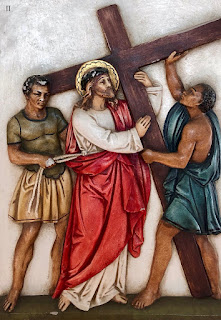Not everyone is comfortable participating in public protests or demonstrations. Perhaps it doesn't feel polite, turning up as a mob to chant and make one's voice heard on an important issue of the day. Or maybe we don't like the kind of people demonstrations sometimes attract. Or we might feel we're not the protesting type; unsure if it will actually change anything. Or possibly we just don’t like crowds. And yet there are time when we must make our voice heard and stand up for what is right.
Jesus’ entry into Jerusalem on a donkey, with the crowds shouting 'hosanna' and paving his way with palms, was a form of protest. It was a parody of the Roman military processions of the time designed to remind people of their power and strength. Jesus’ procession was a demonstration of a different type of reign, an indicator that Jesus’ kingship is based not on power, but on love, self-sacrifice and care for the poor.
photo: Radio Veritas Asi



